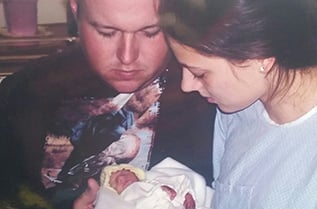Prenatal exome sequencing-XL (PES-XL) is available for patients with abnormal findings on ultrasound. This is a phenotype-driven analysis where only pathogenic and likely pathogenic variants related to the reported clinical features will be included in the prenatal report.
PES-XL can be requested as a duo (maternal and fetal sample) or as a trio (maternal, paternal, and fetal sample). Maternal Cell Contamination (MCC) is required for this test. performing a trio, a separate family studies form and consent is required.
Reanalysis may be requested at no additional charge after the baby is born. Any new medical information should be reported to the lab upon request for reanalysis. A new consent form will be required for reanalysis. Any changes suspected of causing the concerns identified during pregnancy will require a postnatal sample for confirmation.
For this test, a preliminary report is available in 3 weeks from when DNA is extracted in the lab. A final report is issued within 2 weeks after the preliminary report. Cell culture, if needed, may extend turnaround time by 1-4 weeks.
Duo Analysis: 81415, 81416; Trio Analysis: 81415, 81416x2
Please contact the lab.
Prenatal exome sequencing-XL may be indicated in the presence of fetal anomalies. Recently, the American College of Medical Genetics released a statement supporting the use of prenatal exome sequencing in the setting of ultrasound abnormalities since it has demonstrated diagnostic utility in the prenatal setting.
Next generation sequencing
PES-XL detects single nucleotide variants (SNVs) within exonic regions, intronic regions, promoters, and 3’-UTRs. SNVs are only detected in intergenic regions if the variant has been previously reported. PES-XL will also detect copy number variants (CNVs) as well as sequence and CNVs in the mitochondrial genome. If a causative variant is identified during either SNV or CNV analysis, the other analysis may not be performed. However, the clinical team will be given the option to proceed with the full analysis and it will also be noted in the final report. PES-XL will not detect trinucleotide repeat expansions, methylation abnormalities, balanced rearrangements, and some small exonic-level copy number changes. The following will not be reported for PES-XL: variants of uncertain clinical significance, variants in new genes where the function of the gene is currently unknown, secondary findings, benign variants, and carrier status. If requested, the postnatal reanalysis may include additional variants in novel genes and variants of uncertain significance as well as the option to report secondary findings.
Amniotic Fluid: Direct amniotic fluid will be accepted for analysis given there is sufficient volume for back-up culture to be established. A back-up culture at a reference lab OR Greenwood lab is required. Additional charges may apply if cell culture is required after receipt of the sample. If sending direct fluid for PWES-XL only, 10-20 ml of amniotic fluid is requested. Chromosome studies will require an additional 10-15 ml of fluid. Cultured amniocytes: 2x T25 confluent flasks Maternal Sample: A maternal sample is required. Accepted maternal sample types include whole blood in an EDTA/lavender top tube (4-5 ml), saliva/saliva swab, or extracted DNA (≥ 3 μg). For CVS sample, please contact the laboratory to determine if sample can be accepted for PWES-XL. If a postnatal reanalysis or targeted analysis is requested, an additional blood sample after delivery may be requested.
The specimen should be kept at room temperature and delivered via overnight shipping. FedEx is preferred. If shipment is delayed by one or two days, the specimen should be refrigerated and shipped at room temperature. Do not freeze the specimen. Samples collected on Friday can be safely designated for Monday delivery. Please contact the lab with any questions.
Call our laboratory at 1-800-473-9411 or contact one of our Laboratory Genetic Counselors for assistance.
Robin Fletcher, MS, CGC
Falecia Thomas, MS, CGC
Alex Finley, MS, CGC
